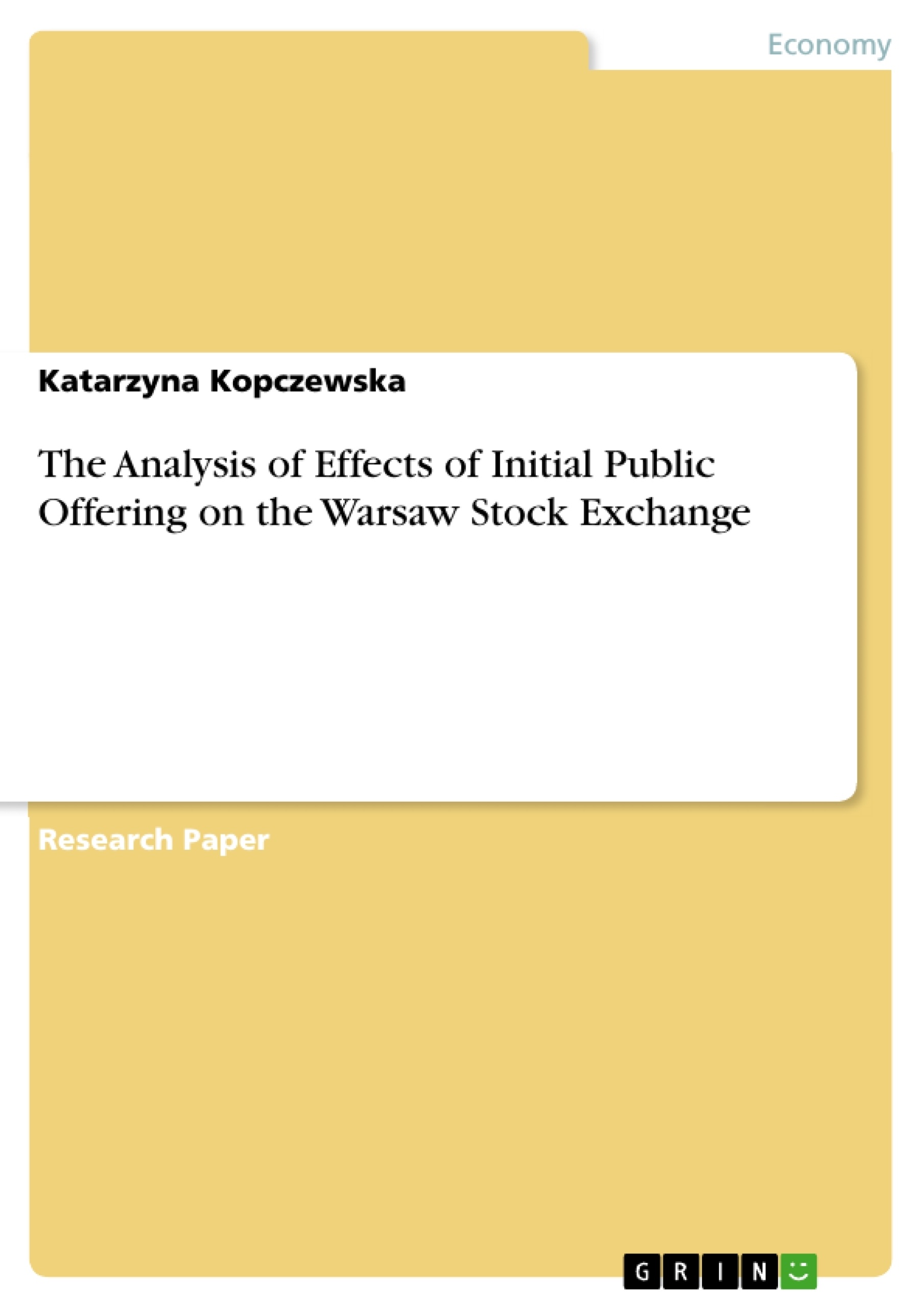European integration will have a real influence on the shape of the financial market in Poland and in other former socialistic countries which undergone the transformation. To stop the tendency of weakening of Polish stock exchange it is important to recognize mechanisms influencing the decisions of companies about the public sale of shares. Decision of companies about the entry on the stock exchange is driven with the expectation that it will help them in the realization of the particular goals. There are many primary reasons for issuing shares, among other to gain the capital on investments, to acquire prestige, to increase sale etc. In Poland till now the entry on the stock exchange of some companies was a method of the privatization, however this process extinguishes. Going public companies will be owned by private businessmen. Hence, very important is to recognize the original mechanisms of initial public offering (IPO). The analysis of IPO effects, enforced with the use of panel models points, that thanks to funds from going public the company realize investment projects and use resources in compliance with declared destination, i.e. on investments, and not on the debts repayment. Public companies do not change their previous capital structure, the debts after the entry on the stock exchange grow to the level from before IPO. Listing on the stock exchange raises the size of the company, but lowers the rate of its growth and decreases the profitability. Findings from research confirm hypotheses that companies go public from the opportunistic motives and then by the way they realize investment programmes.
Inhaltsverzeichnis (Table of Contents)
- Abstract
- Non-technical summary
- Introduction
- Hypotheses concerning the IPO effects
- Growth of firm
- Decrease in leverage
- Fall in profitability
- Growth of investment
- Company performance and the change in the structure of the property
- Construction and estimation of model
- Estimation method
- One-way and two-way model
- Autocorrelation
- Heteroscedasticity
- PCSE model
- Description of panel data
- Selection of variables and estimation of model
- Verification of investigated hypotheses
- Verification of hypothesis about growth of firm
- Verification of hypothesis about fall in leverage
- Verification of hypothesis about fall in profitability
- Verification of hypothesis about growth of investment
- Conclusions
- References
Zielsetzung und Themenschwerpunkte (Objectives and Key Themes)
The objective of this research is to analyze the influence of Initial Public Offering (IPO) on the performance of Polish companies during the first three years after going public. The study aims to understand how IPO affects various financial aspects of companies, including growth, leverage, profitability, and investment.
- Impact of IPO on company growth and profitability
- Relationship between IPO and changes in company leverage
- Analysis of investment patterns after IPO
- Examination of the influence of IPO on company performance and ownership structure
- Exploration of the motivations behind companies going public in Poland
Zusammenfassung der Kapitel (Chapter Summaries)
- Introduction: Introduces the research topic and outlines the significance of IPOs in the context of Poland's economic transformation.
- Hypotheses concerning the IPO effects: Formulates hypotheses regarding the impact of IPO on company growth, leverage, profitability, investment, and ownership structure.
- Construction and estimation of model: Discusses the methodological approach employed in the research, including the panel corrected standard errors (PCSE) method for data analysis.
- Verification of investigated hypotheses: Presents the findings of the research, analyzing the influence of IPO on company performance based on the formulated hypotheses.
Schlüsselwörter (Keywords)
This research focuses on the analysis of Initial Public Offering (IPO) effects on the Warsaw Stock Exchange, utilizing panel data to investigate the impact on company growth, leverage, profitability, and investment. Key themes include emerging markets, financial markets, investment strategies, and the role of IPO in company development.
Frequently Asked Questions
What are the primary reasons for companies to go public in Poland?
Companies go public to gain investment capital, acquire prestige, increase sales, and in some cases, as a method of privatization.
How does an IPO affect a company's profitability?
Research indicates that listing on the stock exchange often leads to a decrease in the rate of growth and a decline in profitability in the first years after the IPO.
Does an IPO lead to a decrease in leverage?
Initially, leverage may drop, but public companies often return to their previous capital structure, with debts growing back to pre-IPO levels over time.
What is the impact of an IPO on company investment?
Companies use the funds from going public primarily to realize investment projects rather than just for debt repayment, fulfilling their declared investment goals.
How does the Warsaw Stock Exchange (WSE) fit into European integration?
European integration significantly shapes the Polish financial market, forcing the WSE to adapt its mechanisms to remain competitive with other European exchanges.
What is the opportunistic motive for going public?
It suggests that companies choose to go public when market conditions are most favorable to maximize the capital raised, often while simultaneously launching investment programs.
- Quote paper
- Katarzyna Kopczewska (Author), 2003, The Analysis of Effects of Initial Public Offering on the Warsaw Stock Exchange, Munich, GRIN Verlag, https://www.grin.com/document/52847



